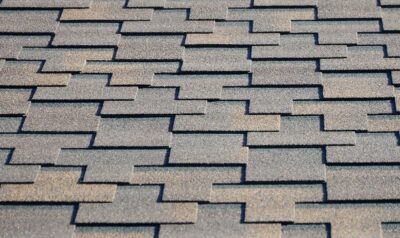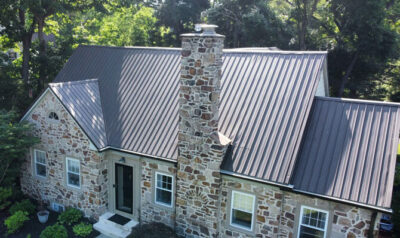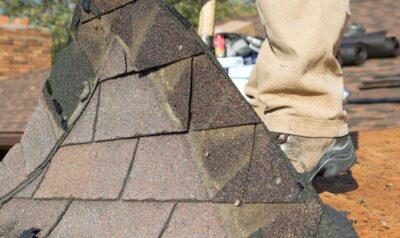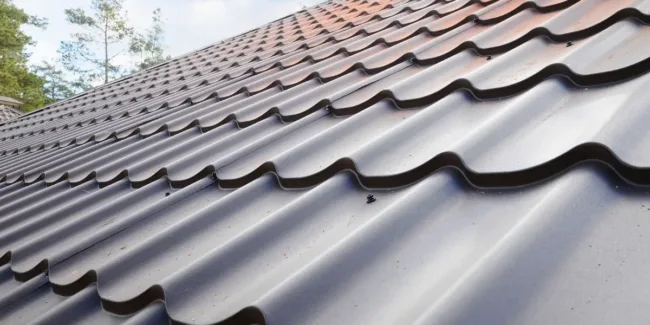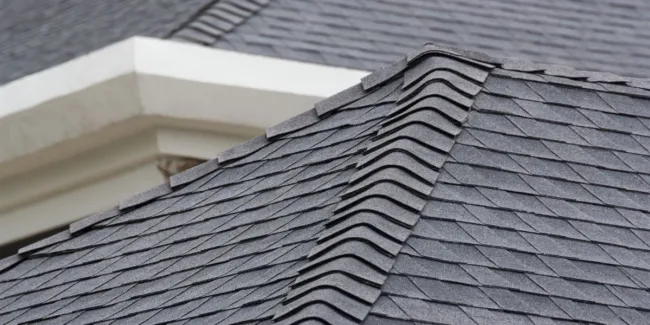Do You Need a Permit to Replace Your Roof in Virginia?
In Virginia, permits are generally required for roofing work that involves structural alterations, significant changes to rooflines, or the replacement of roof sheathing (also known as decking) above certain thresholds.
Specifically, if your project includes replacing more than 256 square feet of roof decking, or if you’re modifying the roof’s structure or fire-rated assemblies, a permit is almost always required. These guidelines are intended to ensure that roofs are properly supported and meet modern building standards, especially in a state like Virginia where climate exposure can accelerate roof wear.
However, the VUSBC also allows for some flexibility. Local building departments have the authority to determine the exact thresholds for when a permit is needed and how these rules are enforced in their jurisdictions. As a result, while the general rules are consistent statewide, the actual permit requirements for roofing projects can vary between different counties and cities.
| Type of Roofing Work | Permit Required? |
| Shingle replacement only (no sheathing) | Usually No (check locally) |
| Replacement of ≤256 sq. ft. roof decking | Usually No (unless fire-rated) |
| Replacement of >256 sq. ft. roof decking | Yes |
| Any structural changes or roofline alteration | Yes |
| Commercial roofing work | Yes |
Roofing Permit Regulations in Virginia’s 5 Largest Counties
To give you a clearer picture of how these rules are applied locally, let’s take a closer look at the permit requirements in the five most populous counties in Virginia: Fairfax, Prince William, Loudoun, Henrico, and Arlington. Each of these counties follows the VUSBC as their baseline, but they also apply their own interpretations and additional review processes depending on local needs.
Do You Need A Permit For Roof Replacement In Fairfax County?
Fairfax County requires a permit for any roof replacement or repair project that involves structural components of the roof. This includes replacing or repairing decking, changing the roofing material (for example, switching from asphalt shingles to metal), or installing features like skylights and solar panels. If your project only involves replacing shingles and there’s no structural work or significant decking replacement involved, a permit is not required. However, homeowners in historic districts or Resource Protection Areas should be aware that additional review processes may apply, even for shingle-only work.
Do You Need A Permit For Roof Replacement In Prince William County?
In Prince William County, the rules are similar. A permit is required if you’re replacing roof structural elements or more than 256 square feet of roof decking. Projects that involve changing the roofline or updating fire-rated assemblies also need a permit. If your project is simply a shingle replacement with no structural work and minimal decking replacement, you typically do not need a permit. It’s important to note that for larger projects that disturb the soil or landscape, such as installing new footings for heavy roofing materials, you might also need a land disturbance permit.
Do You Need A Permit For Roof Replacement In Loudoun County?
Loudoun County requires a permit for any structural repairs, changes in roofing materials, or projects that replace more than 256 square feet of decking. Homes located in historic districts are subject to stricter guidelines and often require extra review, even for minor roofing projects. If you’re only replacing shingles with no structural work or major decking replacement, you generally do not need a permit in Loudoun County. However, because local agricultural and rural areas sometimes have different rules, it’s always wise to confirm with the county’s building department.
Do You Need A Permit For Roof Replacement In Henrico County?
In Henrico County, a permit is required if you’re repairing or replacing more than 256 square feet of roof sheathing (decking) or if you’re making any structural changes, such as modifying the roof’s shape or adding skylights. Shingle replacement alone, with no significant structural work or decking replacement, does not require a permit. An important note for homeowners in Henrico is that if your home was built before 1985, asbestos certification is required for any reroofing project. This ensures that old materials containing asbestos are properly handled and removed to protect both workers and residents.
Do You Need A Permit For Roof Replacement In Arlington County?
Finally, in Arlington County, a permit is required for any roof replacement that involves structural work, changing materials, or significant decking replacement. Projects in high-density or historic areas may also require extra zoning or preservation reviews. For minor shingle replacements with no structural changes, a permit is generally not required. However, because Arlington has a dense urban environment with many historic districts, it’s common for multiple departments to review your permit application to ensure compliance with all applicable rules.
Roofing Permit Regulations in Other Localities
Beyond the top five counties, many smaller jurisdictions in Virginia have similar rules. For instance, Henrico County’s regulations apply to the town of Henrico, while Manassas Park has its own permit requirements. In Manassas Park, both roof shingle replacement and any work involving roof sheathing or decking require a permit, even if no structural changes are involved. This is an example of how local interpretations of the VUSBC can differ, so homeowners should never assume that statewide rules automatically apply to their locality without confirming first.
In Pulaski Town, Prince William County, and similar localities, residential re-roofing that only involves shingle replacement typically does not require a permit. However, any project that involves replacing more than 256 square feet of roof decking does require one. If the existing decking was originally part of a fire-rated assembly—such as in many townhouses—a permit is required regardless of the size of the replacement area. This helps to maintain the safety of multi-unit buildings and ensure that fire safety standards are preserved during renovations.
General Statewide Guidelines and Best Practices
Although each county has its own practices, the following statewide guidelines apply everywhere in Virginia:
- All permits must comply with the 2021 VUSBC as of January 18, 2025.
- A permit is generally required if your roofing project involves structural changes, replacing more than 256 square feet of decking, or altering the roofline in any way.
- Installing skylights, solar panels, or making changes to fire-rated assemblies also requires a permit.
- Simple shingle replacement with no structural work or major decking replacement is typically exempt from permit requirements, but it’s always best to check with your local building department to confirm.
For most Virginia homeowners, this means that if you’re simply replacing old shingles with new ones and there’s no underlying damage to the structure or significant sheathing replacement, you likely won’t need a permit. However, if your project involves more extensive work, it’s crucial to ensure that you have the proper permit in place before starting.
Key Points and Best Practices for Homeowners
When planning a roofing project in Virginia, keep the following best practices in mind:
- Structural Work: If your project involves any structural work—such as altering the roof’s shape, adding skylights, or replacing significant portions of the roof’s sheathing—a permit is almost always required.
- Minor Shingle Replacement: For most homes, simply replacing shingles with no structural work and minimal decking replacement (less than 256 square feet) does not require a permit.
- Local Variations: Local interpretation of the VUSBC can vary widely. In some places like Manassas Park, even minor shingle replacements need a permit.
- Commercial Properties: Permit requirements for commercial properties are stricter, and most commercial roofing work requires a permit regardless of the size or scope of the project.
- Historic or Overlay Districts: If your home is located in a historic district or an overlay zone (such as a floodplain or environmental protection area), additional reviews and permit requirements may apply.
Before starting any roofing project, it’s essential to check with your local building department to verify whether you need a permit. This step can save you time and help you avoid unnecessary fines or stop-work orders during your project.
The Bottom Line for Homeowners
For most Virginia homeowners, replacing shingles alone does not require a permit, provided no structural work is involved and minimal roof decking is replaced. However, if your project includes replacing more than 256 square feet of decking, any structural changes, or if you’re in a historic or overlay district, a permit is required.
Virginia’s roofing regulations can be complex because they combine a statewide building code with local variations in enforcement and interpretation. The best approach is to always check with your local building department before starting your project. Not only does this ensure that your work is compliant with state and local codes, but it also helps you avoid potential fines, delays, or complications that could arise if your project doesn’t meet the necessary standards.
In summary, the rules are designed to protect homeowners, ensure safe construction practices, and maintain the quality and longevity of your home. By taking the time to understand these regulations and working with qualified professionals when needed, you can enjoy peace of mind knowing that your roofing project meets all of Virginia’s requirements and will protect your home for years to come.
Need help with your roofing project? Home Genius covers all permitting and regulation requirements, so you can focus on enjoying a beautiful, durable roof. From handling paperwork and inspections to ensuring full compliance with local codes, we take the stress out of the process and guarantee a smooth, professional installation. Contact Home Genius today to schedule your free consultation and let us take care of the rest!
